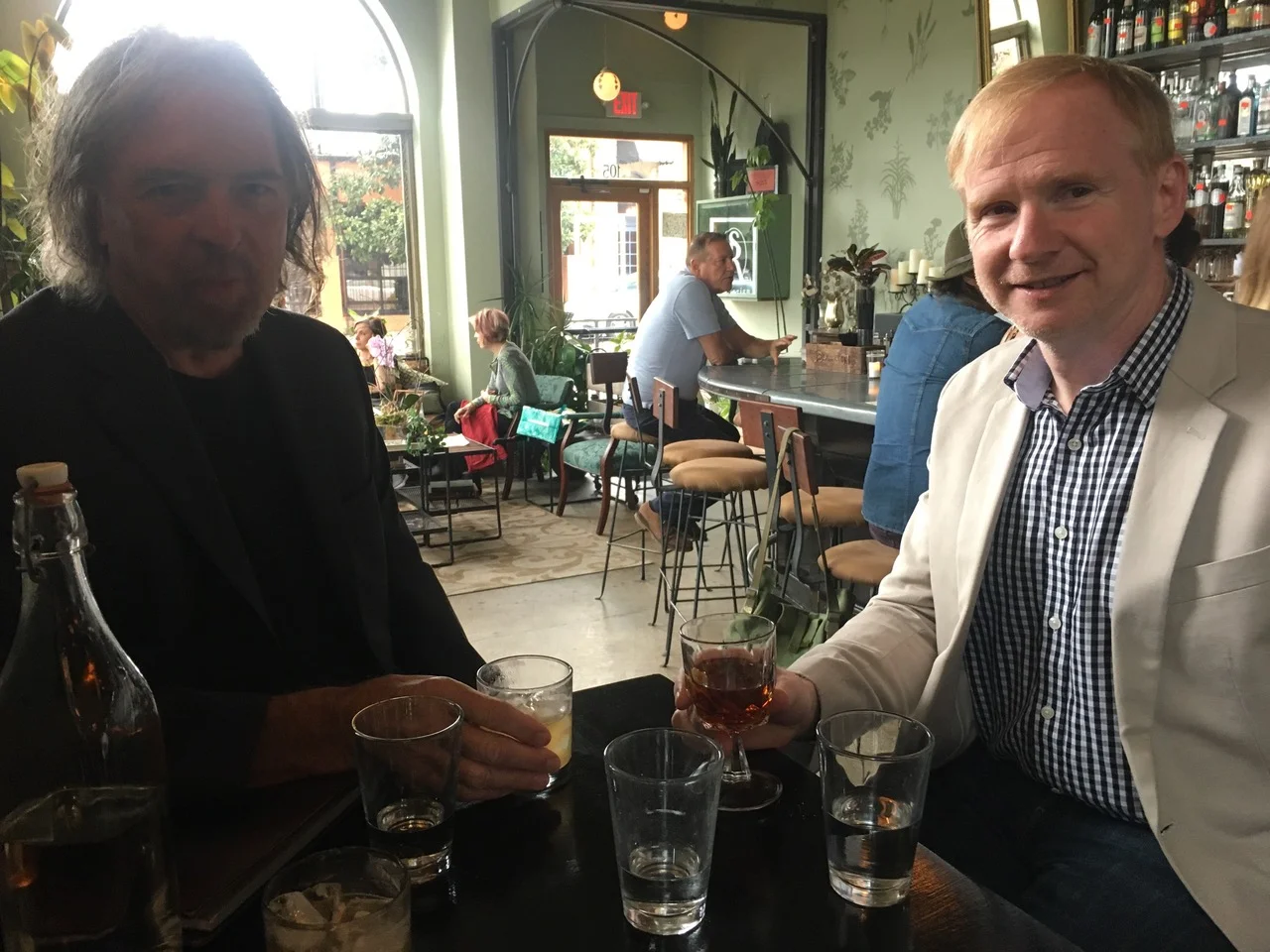Charles Frazier Wants Gin
/By Daren Wang
ASHEVILLE, N.C. — I first met Charles Frazier in the summer of 1997 while his debut novel “Cold Mountain,” was in the midst of a long run atop The New York Times best-seller list. I was traveling the South interviewing authors for a public radio series, and he’d been on a grueling book tour for several months. We sat in his North Carolina living room, and as we talked, I noticed a consistent, long pause before he answered each question. I asked him if he were tired and might want to do the interview another time, but he said he was feeling fine.
Only when I went back to edit the recording did I understand what was going on. Charles Frazier talks like he writes — with perfect sentences that build to logical paragraphs and end at a clear point. There are no stutters, ums, or ahs. (He is an audio editor’s dream.)
The pauses were just him taking a few seconds to plot it all out.
Twenty years later, we’re in Asheville, and the author of “Cold Mountain,” “Thirteen Moons,” and “Nightwoods” has led me and my fellow traveler Joe Borzynski to Sovereign Remedies for a cocktail before a 6 p.m. book event at nearby Malaprop’s.
It’s a drizzly late afternoon, and combined with the early hour, the space is close to empty and we have our pick of tables.
There are comfy upholstered chairs and orchids in the reception area. Sovereign Remedies is more of restaurant with a strong cocktail program than it is a bar.
The cocktail menus come, and a scandal surfaces — the kind of thing that can echo into the highest levels of the Southern literary world.
Charles Frazier wants a gin.
Southern icons are supposed to drink bourbon, but on this early autumn evening, the sharpness of juniper appeals more than the sweetness of bourbon. I convince him to focus on the assigned task, and we order up some No. 27s. The menu says, “Sour Mash Whiskey. Ginger. Cardamaro. Lemon. Bitters.”
We have only just ordered, and the second scandal has reared up.
Sour mash? Does that qualify?
If it does, then what about rye? Tennessee whiskey?
Which is bourbon? Which is not? What qualifies in this quest?
The answer is, “It depends.”
I know what you’re thinking: Fire and brimstone coming down from the skies, human sacrifice, dogs and cats living together, mass hysteria!
In a couple weeks, I’ll be in New Orleans and I will be going for a Sazerac at the Napoleon House. If you want to eliminate one of the foundational drinks of the South because it is based on rye, then I’d invite you to count the number of angels that can dance in a bottle of Michters.
In other words, “Lighten up, Frances.”
And it certainly doesn’t matter in this case. Was the sour mash simply Jack Daniel’s? Perhaps. Maybe it was Jack Daniel’s Tennessee Honey? I wouldn’t rule it out. Could it have been Jack Daniel’s Tennessee Fire? Eh, probably not, but I couldn’t say.
What I hope they didn’t use a $90-per-bottle, artisanal, small-batch liquor that some tattooed, bearded, and earnest craftsmen sweated over. It wouldn’t make a difference here. No subtlety is going to survive a cocktail shaker with ginger, Cardamaro, lemon, and bitters.
That’s not to say the cocktail wasn’t good. It was actually quite good. Dominated by the ginger and lemon, it would go down perfectly on a Southern August evening, looking out on those gorgeous Asheville mountains. But this was a drizzly day, and it just didn’t work.
As for the cardamaro, I’m not sure I could identify it in a lineup. Perhaps if it were based on cardamom, it could have held up to the ginger/lemon onslaught. Instead, it’s an apertif derived from cardoons, and it would require a finer palate than mine to find a hint of artichoke thistle in that glass.
Charles might as well have asked them to make it with gin.
Frazier had taken a break from final edits on “Varina,” a novel due for release in April of 2018. It is a partial return for him to the Civil War era, and will tell the surprising story of Varina Howell Davis, Jefferson Davis’ wife. In the early 20th century, prompted by the unexpected reappearance of someone she thought long lost, an elderly Varina re-evaluates her youth and the war. Charles promises that it includes the barest minimum of Jefferson Davis possible.
I can’t remember what political firestorm had happened the particular day we chatted — they’ve become so constant that they blend into a stream. Charles talked wistfully of his college days in the ’70s, when it wasn’t difficult to see a future when the battles of the Civil War would no longer be fought.
“I can’t say that I can imagine that now,” he said.
It was close to 6, and we needed to get over to the bookstore, though I could have used a straight shot by that point.


